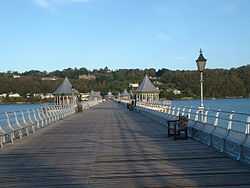Garth Pier
 | |
| Official name | Garth Pier |
|---|---|
| Carries | Pedestrians |
| Spans | Menai Strait |
| Locale | Bangor, Gwynedd, North Wales |
| Design | J.J. Webster |
| Owner | Bangor City Council |
| Total length |
As built: 1,550 feet (470 m)[1] Current: 1,500 feet (460 m)[2] |
| Opening date | 14 May 1896 |
| Toll | Optional 30p |
| Coordinates | 53°14′18.58″N 4°7′26.76″W / 53.2384944°N 4.1241000°WCoordinates: 53°14′18.58″N 4°7′26.76″W / 53.2384944°N 4.1241000°W |
Garth Pier is a Grade II listed structure in Bangor, Gwynedd, North Wales. At 1,500 feet (460 m) in length, it is the second-longest pier in Wales, and the ninth longest in the British Isles.
Construction
Designed by J.J. Webster of Westminster, London, the 1,550 feet (470 m) pier has cast iron columns, with the rest of the metal structure made in steel, including the handrails. The wooden deck has a series of octagonal kiosks with roofs, plus street lighting, which lead to a pontoon landing stage for pleasure steamers on the Menai Strait.[1][2]
History
Opened to the public on 14 May 1896, the ceremony performed by George Douglas-Pennant, 2nd Baron Penrhyn. A 3 ft (914 mm) railway for handling baggage which had been included in the design, was removed in 1914.[2]
The pontoon handled the pleasure steamers of the Liverpool and North Wales Steamship Company to/from Blackpool, Liverpool and Douglas, Isle of Man.[1] In 1914, the cargo steamer SS Christiana broke free from the pontoon overnight,[1] and caused considerable damage to the neck of the pier. A resulting gap to the pontoon was temporarily bridged by the Royal Engineers, that remained until place until 1921 due to the onset of World War I. By this time, additional damage had occurred, and repairs took a few months over the originally envisaged few weeks.[2]
Threat of demolition
In 1971, the pier closed on safety grounds, with ownership being passed to Arfon Borough Council in 1974. The council took the immediate decision to demolish the pier, but Bangor City council objected, obtaining a Grade II listing for the structure, with the planning officer considering it one of the three finest surviving piers in Great Britain.[1][2]
Purchasing the pier for a nominal 1p in 1975,[3] in 1982 renovation, undertaken by Alfred McAlpine commenced, taking until 1988 to complete. Financial assistance was given from the National Heritage Memorial Fund, the Welsh Office and Manpower Services Commission. The pier was reopened by George Paget, 7th Marquess of Anglesey on 7 May 1988.[2]
Present
Now Grade II* listed, the pier is free to access, but there is an honesty box at the throat requesting that each walker contribute 50p to the pier's upkeep. The pier gates remain open until 9 pm in summer, with pre-booked night fishing available.[1]
Due to its location and length, at low tide the site is a haven for local seabirds to access the rich mud of the Menai Straits, allowing close viewing of oystercatchers, redshanks, curlews, little egrets and the occasional cormorant.[4]
The kiosks, apart from the one at the end housing a traditional seaside tearoom, have been rented out to local societies, including Marine Awareness North Wales who run day lectures and tours of the local wildlife, and the Bangor branch of the Soroptimists.[4] There are also seats along the promenade, with memorial benches to RAF Group Captain Leslie Bonnet and writer Joan Hutt.
Now in need of additional works, and part of the plan for the redevelopment of Hirael Bay, locals have expressed concern over the council's ability to provide the required £1 million of funds.[5]
References
- ↑ 1.0 1.1 1.2 1.3 1.4 1.5 "Bangor Pier". National Piers Society. Retrieved 20 February 2012.
- ↑ 2.0 2.1 2.2 2.3 2.4 2.5 "Bangor Pier". theheritagetrail.co.uk. Retrieved 20 February 2012.
- ↑ "Bangor Pier". BBC Wales. Retrieved 20 February 2012.
- ↑ 4.0 4.1 "Bangor Pie r". northwales.co.uk. Retrieved 20 February 2012.
- ↑ Bissett, Daniel (1 December 2010). "Concern over the future of Bangor Pier". Bangor and Anglesey Mail. Retrieved 20 February 2012.
External links
| Wikimedia Commons has media related to Bangor Pier. |